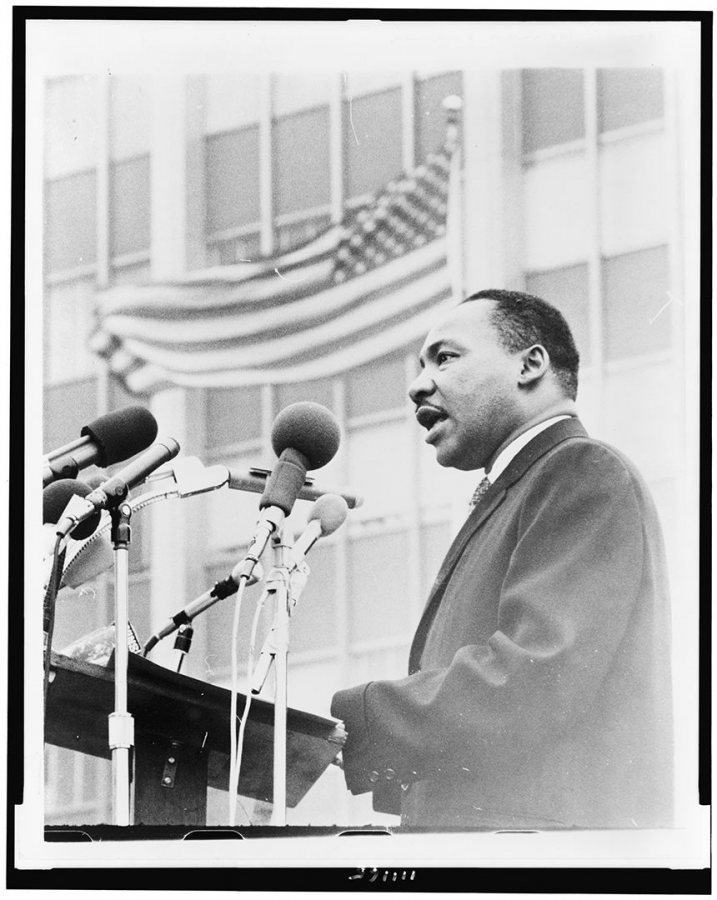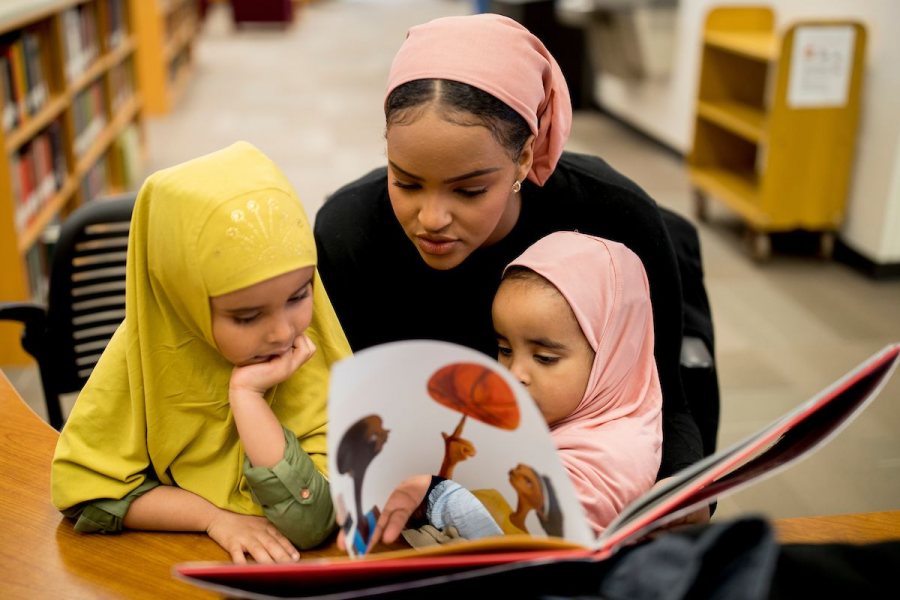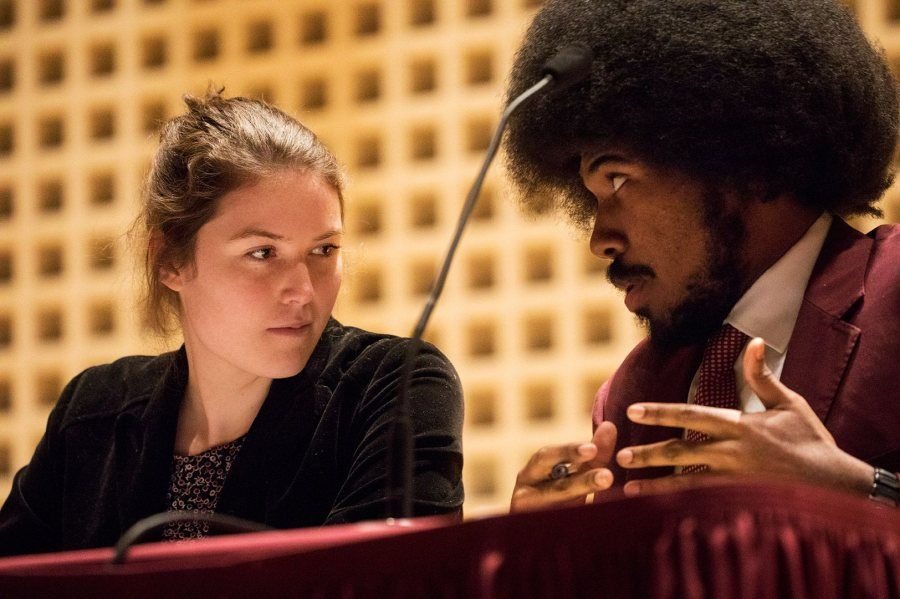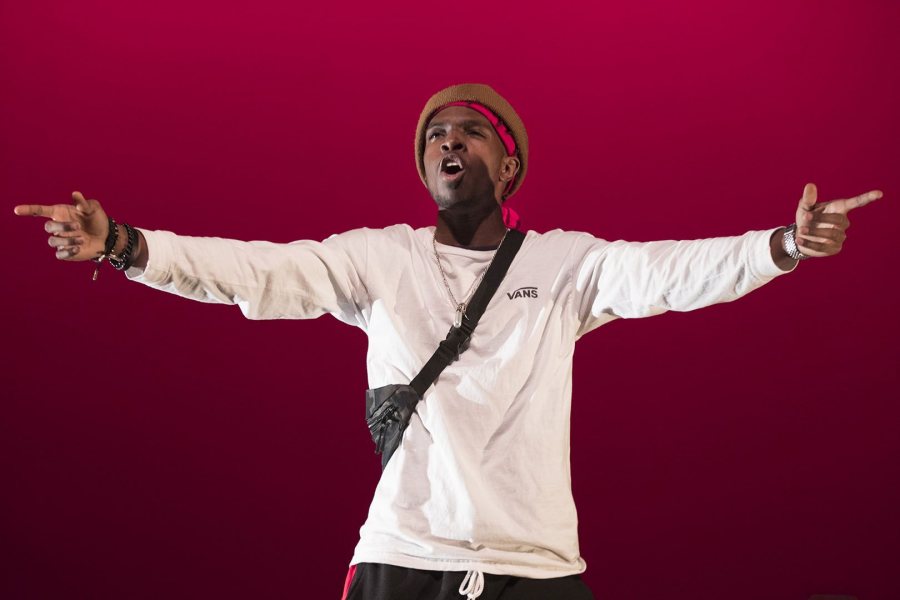MLK Day 2019 at Bates College: Schedule of Events
CANCELLATIONS AND REVISIONS: Because of weather-related travel conditions, Bates has changed the schedule for its 2019 MLK Day observance.
- On Sunday, Jan. 20, the Sankofa rehearsal is no longer open to the public.
- The Rev. Dr. Martin Luther King Jr. Interfaith Service, also on Sunday, has been canceled.
- The keynote address by Barbara Ransby on Monday, Jan. 21, was canceled and rescheduled on March 25, 2019. A copy of the talk can be seen here.
https://www.youtube.com/watch?v=XwnbgZC1VOY - Also on Monday, the 10:45am presentation “Gender Trouble: Manhood, Inclusion, and Justice” has been canceled; and the location for the workshop “Women of Color Leading the Way” has been changed to the Edmund S. Muskie Archives.
The theme for Bates’ 2019 MLK Day observance is “Lifting Every Voice: Intersectionality and Activism.” Read on for the entire schedule or jump ahead by date, Jan. 20–23.

Martin Luther King Jr. addresses an antiwar demonstration in New York City in 1967. World Journal Tribune photo by Don Rice / Library of Congress Prints and Photographs Division
Sunday, Jan. 20
2–8pm | Afternoon Events
2pm | Strong Island
Film and discussion. Director Yance Ford’s documentary Strong Island chronicles the arc of a family across history, geography, and tragedy — from the racial segregation of the Jim Crow South to the promise of New York City, and from the presumed safety of middle-class suburbs to the maelstrom of an unexpected, violent death. It is the story of the Ford family and how their lives were shaped by the enduring shadow of race in America. A deeply intimate and meditative film, Strong Island asks how one grapples with a complicity of silence that can bind a family in an imitation of life, and bind a nation with a false sense of justice. (2017; 107 min.) Facilitator: James Reese, Associate Dean for International Student Programs.
Pettengill G52
4pm | Sankofa — CLOSED
This event is no longer open to the public.
7pm | The Rev. Dr. Martin Luther King Jr. Interfaith Service — CANCELED
The service featuring the Rev. Dr. Theresa Thames has been canceled because of weather-related travel conditions.
Monday, Jan. 21
The Rev. Dr. Martin Luther King Jr. Day Keynote — CANCELED
The keynote address by Dr. Barbara Ransby has been canceled because of weather-related travel restrictions. Bates’ MLK Day programming begins today with the 10:45am concurrent workshop session.
10:45am–12:15pm | Workshops, Session I
Prisons Will Not Save Us: Incarcerated Black Trans Folks and Decolonial Abolition Praxis
Workshop. Prison abolition is part of Martin Luther King Jr.’s legacy for intersectional justice. In this workshop, AK Wright ’17, a graduate of the Program in Women and Gender Studies at Bates and a doctoral student in feminist studies at the University of Minnesota, will present their research connecting the project of decolonial feminism to the experiences of black trans folks in the carceral state. They will then engage the audience in a discussion of abolition as a community process, working through the challenges of abolition and connecting folks with concrete ways they can support trans prisoners. Led by AK Wright. Sponsor: Program in Gender and Sexuality Studies.
Pettengill G21
‘Gender Trouble: Manhood, Inclusion, and Justice’ — CANCELED
The presentation by Shatema Threadcraft, Associate Professor of Government at Dartmouth, has been canceled because of weather.
Effective Allyship
Workshop. Often, activism and allyship are misconstrued as liking a Facebook post, having a friend from a background different from yours, or signing a petition and giving yourself that pat on the back. At Bates, we often use the ideology that Bates has been open and accessible to all, and is mostly liberal. This allows a false sense of solvency for Bates students working towards equity, inclusion and justice. Activism means actively fighting for justice, be it racial, economic, queer, or trans justice. This workshop examines active allyship for college students and shows how we can propagate anti-racism and anti-transphobia for the liberation of students within our community and the larger world. Led by Trisha Kibugi ’21.
Pettengill 162
How to Maintain Our Wild Tongues
Workshop. In her 1987 essay “How to Tame a Wild Tongue,” Gloria Anzaldúa illustrates the value of mestiza discourse and illustrates a path of resistance to the violence of monolingualism. Thirteen years prior, the National Council of Teachers of English had published “Students’ Rights to Their Own Languages” — a policy statement asserting “students’ right to their own patterns and varieties of language — the dialects of their nurture or whatever dialects in which they find their own identity and style.” But the experiences of many of us today demonstrate that much more work is needed. This workshop offers an opportunity to follow Anzaldúa’s path. At its heart will be an interactive discussion employing the Collective Action Tree model to apply research about language to our values, to chart the steps toward becoming a community that supports multiple languages and dialects, and to ensure we encourage diverse voices and visions. Led by Mayelin Burgos ’19 and Sarah Raphael ’21; Stephanie Wade, Bridget Fullerton, Dan Sanford, and Eric Dyer of Writing@Bates and the Academic Resource Commons; and Charlene Holmes, Office of Intercultural Education. Sponsors: Academic Resource Commons and Writing@Bates.
Ladd Library, Writing and Language Center
A Discussion of Criminology and Race Led by Hillview Boys Aspirations
Presentation. Working with the Boys Aspirations program at the Hillview public housing community, a team of five men of color at Bates will be undertaking a research project. The research topics specifically tackle social injustice (criminology, police brutality, racial discrimination, and the poverty gap). Led by Ellijah McLean ’20, Areohn Harrison ’20 and Justice Prewitt ’20.
Commons 221
‘May We Forever Stand’: The Black National Anthem
Presentation. “May We Forever Stand” takes as its point of departure Imani Perry’s recent work on the history of the song “Lift Every Voice and Sing,” often referred to as the black national anthem. Penned by James Weldon Johnson and John Rosamond Johnson, “Lift Every Voice” was developed against the backdrop of a late-19th-century focus on the “politics of respectability,” and in the context of its authors’ status as “race men.” The Johnson brothers were using the Western classical tradition to show that African American people were worthy of citizenship. Subsequently, though, musicians and artists have embraced “Lift Every Voice” for a variety of political and cultural contexts extending well beyond the circumstances of its creation. The myriad adaptations of the anthem attest to the power of music as a site for political mobilization, community building, and world-making in the black freedom struggles. Led by professors Dale Chapman and Charles Nero. Sponsor: Program in African American Studies.
Hedge 106

Rakiya Mohamed ’18 of Auburn reads in Ladd Library with her sisters Sareen Hassan, 6 (left), and Saheen Hassan, 5 (right), on MLK Day 2018. (Phyllis Graber Jensen/Bates College)
Women of Color Leading the Way
Books for children. Children and caregivers are invited to the first floor of Ladd Library to meet visionaries, activists, and world-changers through pictureful pages. We’ll share stories of and create art about extraordinary women in an event hosted by Diverse BookFinder, a Bates College collection of picture books portraying people of color and indigenous people. The collection and its landmark online database were founded by Krista Maywalt Aronson, Associate Professor of Psychology, in collaboration with children’s book creator Anne Sibley O’Brien, humanities librarian Christina Bell, and Brenna Callahan ’15. Part of the permanent library collection, these books are housed on the first floor to the right of the entrance and are available to everyone at Bates and beyond for personal use, research, and education. Led by: Krista Aronson and the Diverse BookFinder Team.
Edmund S. Muskie Archives (new location)
12:30–1:45pm | Midday Programming
12:30–1pm | Lunch
Special price of $6.50.
Commons
12:30–1:15pm | MLK Day Reading
Discussion circle. This year’s MLK Day reading selection is Real American: A Memoir by Julie Lythcott-Haims. It’s the story of how race informs identity and feelings of belonging in the United States. Who is a “real American?” Lythcott-Haims asks, and who gets to make that determination? What is it like growing up in a country that, in many ways, views you as an outsider? Hailed by human rights lawyer Bryan Stevenson (Bates’ 2018 commencement speaker) as “a compelling, incisive, and thoughtful examination of race, origin, and what it means to be called an American,” Real American is a must-read for anyone seeking to better understand issues of race and identity in this country. Participants are invited to bring a lunch and requested to RSVP to the MLK Planning Committee by Jan. 10: Please sign up here. or join the webinar-based book discussion here Real American: A Memoir Led by the MLK Day Planning Committee.
Commons 221–222
1–1:45pm | Bates Voices: Honoring Martin Luther King Jr.
Readings. Bates faculty, staff, and students honor King’s work by sharing both short original writings addressing his legacy, and excerpted texts that have inspired the readers.
Commons Fireplace Lounge
1:15–3:30pm | Sorry to Bother You
Film and discussion. Boots Riley’s 2018 film takes code-switching to a new level as an African American telemarketer finds stunning success, and ultimately a moral dilemma, when he develops a new style of sales pitch. A screening of the film is followed by a discussion examining the film’s portrayal of worker activism and (plot-twisting) relationship to Martin Luther King Jr., its anti-capitalist stances, and its portrayal of code-switching for people of color. Adult content (2018, 111 min.) Panelists: professors Charles Nero, and Lisa Maurizio. Sponsors: Filmboard, Program in African American Studies.
Olin 104
2–3:30pm | Workshops, Session II
#MeToo means Who?
Panel. While #MeToo has made sexual assault visible as never before, whose stories and which targets are in the spotlight? This panel will illuminate the margins and reveal circumstances that create vulnerability for women and LGBTQ persons whose stories might never make the (social) media spotlight. Participants will swivel the “prism of difference” to invite the audience to examine difficult questions about who deserves to be heard, who gets restitution, and who gets to decide. Will #MeToo, for all its current momentum, create change that will truly help a broad spectrum of women and queer folks? Led by professors Rebecca Herzig, Melinda Plastas, Emily Kane, Carolina González Valencia, and Sue Houchins. Sponsor: Program in Gender and Sexuality Studies.
Hedge 106
Beyond Awareness: The Activist Challenge of History
Panel. The Haitian historian Michel-Rolph Trouillot wrote, “The ultimate mark of power may be its invisibility; the ultimate challenge, the exposition of its roots.” How are our understandings of hidden roots related to our activisms in the present? Members of the history department will reflect on this relationship — and although the panel features historians, we invite all to take part who think about the relationship between scholarship and activism, in terms of both scholarship’s capacity and its limits for promoting activist engagement. Led by: professors Margaret Creighton, Wes Chaney, Alexis Baldacci, Patrick Otim, and Gerald Bigelow.
Commons 221
At the Intersection of Race, Gender, and Geography: Criminal Justice Sentencing in the United States
Presentation. A long line of research indicates that there are racial disparities in the severity of sentences across the criminal justice system. Specifically, black people tend to receive harsher sentences than whites who have committed comparable crimes. Yet little is known about how race and gender together play a role in sentencing across social contexts. This presentation will highlight an intersectional research project intended to improve the understanding of sentencing disparities between race and gender across rural and urban settings. This work is essential for improving fairness and equality in criminal justice processing. Led by criminologist Chad Posick.
Commons 226
On the Value of Intersectionality in the Social Sciences
Workshop. Social science research often figures in debate about such issues as healthcare, mass incarceration, affirmative action, and same-sex marriage. Even if you don’t conduct social science research yourself, you’ll encounter it if you follow such debates. This session will help you evaluate this research, with an eye to power, exclusion, and overgeneralization. Building on the work of Kimberlé Crenshaw and others, psychologist Elizabeth Cole has proposed that an intersectional approach can add value to empirical research in psychology. She lays out key questions at the center of this approach: Who is included within [a given] category? What role does inequality play? Where are there similarities? This workshop will explore the implications of Cole’s ideas for research and teaching throughout the social sciences, not just psychology. Following an overview, small-group activities and discussion will focus on ways that her ideas apply to specific research examples. The ultimate goal is to prepare participants to ask the kinds of questions that an intersectional approach requires when we encounter research. Led by professors Alex Borgella, Su Langdon and Michael Sargent, Department of Psychology.
Pettengill G21
Lifting Every Voice at Bates
Panel. Panelists will discuss how their voices at Bates have been silenced and how Bates can allow and truly take in a student’s freedom of speech. This session will consist of a series of questions that interrogate intersecting identities at Bates. Panelists will share stories, anecdotes, and experiences of how their voices have been silenced and what can be done to make Bates a more welcoming community. Led by Areohn Harrison ’20 and Alex Onuoha ’20. Sponsor: Amandla! Black Student Union.
Pettengill G52
The American Dream Is a Right: Immigrant Activism in Maine
Panel. Local and state activists for immigrant rights discuss issues of citizenship, the right of asylum, women’s rights, and economic rights in the present climate of xenophobia. Led by: Baltasar Fra-Molinero, Professor of Latin American Studies. Sponsor: Program in Latin American Studies.
Pettengill G65

Abby Westberry ’19 and senior William Coggins of the Morehouse College debate team deliberate before the Rev. Dr. Benjamin Elijah Mays, Class of 1920, Debate on Jan. 15, 2018. (Theophil Syslo/Bates College)
3:45–5pm | The Rev. Dr. Benjamin Elijah Mays, Class of 1920, Debate
This ever-popular contest between Morehouse College and Bates students honors Dr. Mays, a Bates debater, longtime president of Morehouse, pioneer of the civil rights movement, and primary mentor to Martin Luther King Jr. This year’s motion: “This House believes that social justice movements should prioritize socioeconomic class over race and gender.” Free but tickets required: bit.ly/2019debate or 207-786-6400.
Olin Concert Hall | Watch the livestream at bates.edu/mlk/live

Bates’ 2018 MLK Day observance ended with the powerful Sankofa performance “Try, Try Again,” created and directed by Michael Hogue ’20 of Chicago. (Phyllis Graber Jensen/Bates College)
7:30pm | Evening Program
Sankofa
Performance. The students of Sankofa explore the stories of the African diaspora through dance, music, theater, spoken word, and more. Sankofa’s annual MLK Day production is a symbol of pride and accomplishment for members of the African diaspora at Bates, and a diversifying experience for the Bates community. The 2019 crew includes stage manager Zach Jonas ’20 of Needham, Mass.; lighting designer and board operator Aimee Oakes ’20 of Asheville, N.C.; and sound engineer and board operator Henry King ’22 of South Salem, N.Y. Free but tickets required: bit.ly/sankofa19.
Schaeffer Theatre
Wednesday, Jan. 23
1:30–2:30pm | The Rev. Dr. Martin Luther King Jr. Read-In
Bates staff and students volunteer to share books and read with a fourth-, fifth-, or sixth-grader at Martel School. Books will be given to the classrooms to keep. Transportation departs the Harward Center for Martel School at 1:10pm and returns to campus by 2:40pm. FMI Ellen Alcorn at 207-786-8235 or ealcorn@bates.edu. Snow date: Friday, Jan. 25.